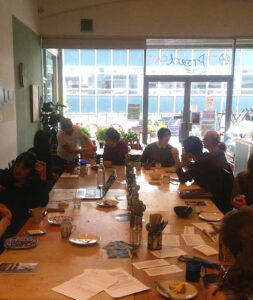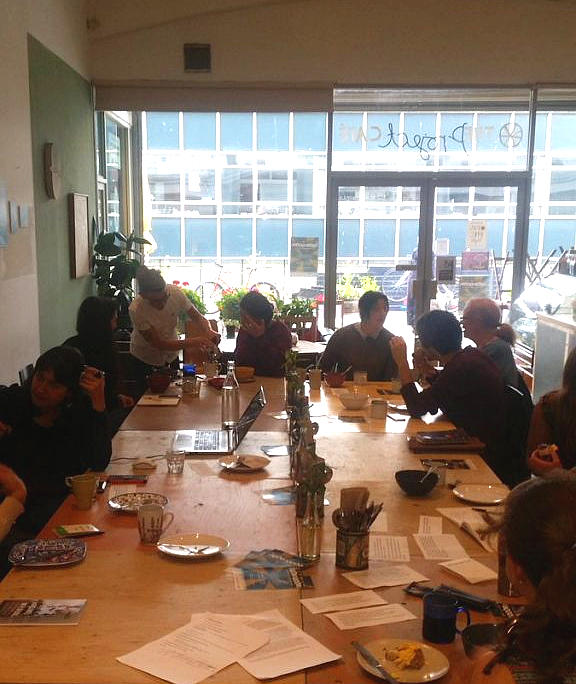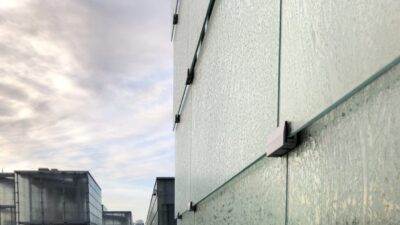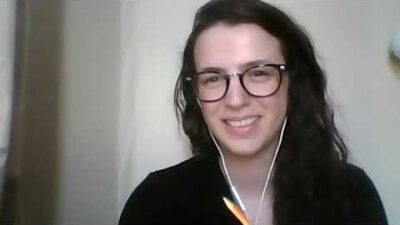Brexit by now seems like a giant train wreck that nobody knows how to shift or lift, and which is rapidly becoming an accepted part of the landscape. Any concrete decisions are stalled and the same tired arguments are rehashed time and again, making us feel the opposite of ‘strong and stable’ and encouraging us to lose interest. But through this boredom, we risk missing the important decisions that are being made without us, so events like Unbrexfast are an important way of reigniting interest, providing critical education and reflecting as a means to guide our actions in the future, and helping us imagine ways in which to move forward.

After a round of introductions, we shared a delicious vegetarian/vegan breakfast and chatted away amongst ourselves, before coming back to the larger group and describing some of the topics that had come up: our food system and food security, the aspect of care in our society and how it relates to grassroots movements, and communication and xenophobia. We then split into three teams and each was asked to look at one of these issues: defining it, talking about the resources that were already available, and thinking about what else would be needed to address that issue.
Our food system
This group decided to talk about ‘food system adaptation’ rather than ‘food security’, because the word ‘security’ may have some negative connotations. They also spoke about the local and the global: how to address local issues with global responsibility – for example Fair Trade – and supporting transparency in the food chain.

There is currently a lot of talk about rising food prices, but actually many prices are artificially depressed (e.g., products such as milk have no fair trade standards for a large part of their production). So what we’ll really be seeing is the actual price of food, which will be a shock and could be quite traumatic, especially for people already needing to use food banks. So how do we protect the most vulnerable and educate ourselves about food and its production? Food standards, workers’ rights, permaculture, animal welfare, GM free crops: all of these are needed. Examples given as good models were the Emilia Romagna cooperatives in Italy and the amazing Via Campesina movement that started in a little town in Spain. The main idea was that we should not leave it up to someone else, but that we need to take action ourselves.
Realising what networks we already have locally in regards to food can help us to understand how to better address the issue, and tools like the Green Map initiative can be useful (and has already been done for Glasgow’s West End). But at the moment, there are no easy answers to a lot of hard questions.
The Good Food Nation Strategy came out of the Community Empowerment Act. Every local authority has 2 years to write their food strategy, but currently don’t really know what to do, and are undergoing consultations. Talks are still underway as regards to what a “good food nation” means. It was suggested that the consultation was maybe not asking the right questions, Perhaps the important questions are how we can make food growing relevant to people? How can use this to create jobs? Can we create market gardens? How much food do we need? Do we need a specific target e.g., to produce 50% of our food in Scotland? And how do we link to European peasant movements, as well as the existing local food movement? Overall, more thought needs to be given about how we do things, especially if there is need to scale-up food production in Scotland. For example, a number of community gardens previously maintained by grants have now been abandoned, indicating a lack of joined-up thinking. However, It’s important to note that there need not be a single model for this; several models could exist at the same time, tailored to the specific needs of different communities.
Care and grassroots movements
The group discussed the global trend towards eroding communities, breaking them apart by various political mechanisms: the processes of gentrification, urban planning strategies, and the restructuring of economic activities. This means people become more isolated, feeling very unsafe, at risk of physical violence from other groups, and feeling powerless because they don’t always understand what is happening and the decisions are always being made elsewhere. So it is important to create safe spaces for those affected, offering them the time and resources that will allow them to think about things beyond their own immediate survival.
Community and communal spaces, integration networks, and places like Galgael, provide people with safety in the face of different kinds of vulnerabilities. Although equality policies may often seem paternalistic, and organisations may be seen to be merely ‘ticking boxes’ to adhere to them, they are still worth defending. But it’s important to actively nurture emotional connections rather than just focusing on gestures of solidarity; to support diversity and not just push for integration.
Communication
This group had quite a broad discussion, noting that a lot of communication consists of people trying to advance their often rather narrow and set views, seeking to justify those views rather than engage in a dialogue. However, in some communities in Scotland, there’s a growing interest in the Art Of Hosting approach, Theory U and the U lab platform, and the perspective of Living Systems i.e., how people are inseparably part of the natural world but are often seen as being isolated from, or somehow immune to the effects of, natural processes.
In terms of ways forward, there are a number of very active groups around different themes, but what they need to do is to improve their communications. There are a range of really good thinking techniques and practices available, including those listed above and other practices such as Non-Violent Communication (NVC), but it’s necessary to find ways to practice these, and add to them and change them. The notion of “Act as if you own it” was repeated several times, as well as Harry Burn’s theory of “Just do it” (rather than hoping for the government to eventually solve the problems). How can communication be achieved across Scotland, to join up different networks and get a stronger civic voice for Scotland? The problem is that if each network acts alone, they tend to run out of steam, and then 10 or 20 years down the line not much has changed.
So the best chance for survival is if different networks can find ways to link up. More opportunities are needed to meet and engage with those people that we wouldn’t normally meet in everyday life. Training in communication techniques is needed, as well as the space to practice and be supported in using them. Currently in place are the Centre for Human Ecology, Galgael, and the Govan Folk University. These are all a start in creating our own institution of learning; one that truly comes from those community voices and encourages real, engaged communication as opposed to the arid and divided discussion that often arises from party politics.
An ongoing conversation
Through events like Unbrexfast, the CHE is looking to build channels of communication and see where it takes us. The next step is all an all-day Unbrexable event that is taking place on the 2nd of September, which will be more in the style of a conference, with a full day of workshops and more guided conversations. Stay tuned!




